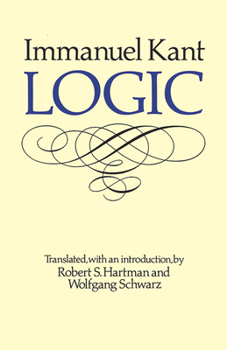Logic
Select Format
Select Condition 
Book Overview
The second, corrected edition of the first and only complete English translation of Kant's highly influential introduction to philosophy, presenting both the terminological and structural basis for his philosophical system, and offering an invaluable key to his main works, particularly the three Critiques. Extensive editiorial apparatus.
Format:Paperback
Language:English
ISBN:0486256502
ISBN13:9780486256504
Release Date:April 1988
Publisher:Dover Publications
Length:288 Pages
Weight:0.71 lbs.
Dimensions:0.5" x 5.4" x 8.4"
Customer Reviews
2 ratings
Explore the horizon of cognition.
Published by Thriftbooks.com User , 22 years ago
"Many persons find fault with all subtlety, because they cannot attain it. But in itself it always does honor to the understanding and is even meritorious and necessary, as long as it is applied to an object worthy of observation." Between Plato's "pure reason" and Stephen Hawking's cosmological "horizons" stands Immanuel Kant, reaching out across the annals of critical thought, intent on disciplining the human mind in its pursuit of truth. "All nature actually is nothing but a nexus of appearances according to rules; and there is nothing at all without rules. When we believe that we have come across an absence of rules, we can only say that the rules are unknown to us." With these words, Kant begins his examination of the relationship of cognition and logic, seeking to reduce the science of thought to rules of pure reason. The history of the science of logic has produced a rather short list of so-called greats -- Aristotle, Leibniz, Wolff, Kant. Logic may be defined as the [fairly concise] science of all other sciences, and as Kant points out, not many giants or revolutionaries are needed. What the science of logic always lacks is simply this -- persons who are cognizant of it. To this end Kant offers his Logic, published in 1800 as a text for his philosophy students. Squeezing large ideas into small words is always a great difficulty when the pursuit is one of exactitude. If this isn't immediately self-evident then Kant's extensive focus on definitions make this aspect of logic painfully clear. He acknowledges the limitations of the human mind in its separateness from pure truth, asking, "What can man, as man, know at all?" The problem of language is a very large part of the human mind's difficulty and is addressed by Kant in the constant offering of definitions and comparisons of definitions. Thus portions of the text are tiring, but put on your "thinking cap" and hang in there. Kant abruptly steps from the tedious dictionary of Kant into brilliant sequences of reason that will excite the understanding and sensibility of the reader. I repeatedly found myself thinking: "Yes -- that's exactly right, I wouldn't have known how to articulate that relationship so clearly." The notoriously difficult Kant can become surprisingly translucent. I enjoyed this book beyond my expectations, and Kant even tells me why this is the case: "Our understanding is so organized that it finds satisfaction in mere insight, even more than in the utility arising from it. Plato had already observed this. Man herein ... sees what it means to have understanding. Men who lack this sense must envy animals." As the work is largely a struggle with words, it is not surprising that the translators' introduction is so lengthy. It is also quite helpful, exploring, for example, Kant's indebtedness to Leibniz.
Useful and very interesting for students of Kant
Published by Thriftbooks.com User , 23 years ago
Kant never wrote a book on Logic; this book is an authorized compilation of his lecture notes, edited by a graduate student of his, Gottlob Jaesche. It's not clear how much of it is Kant's work, what was added by Jaesche, and what goes back to the textbook Kant used for the course. Under these conditions it would be too much to expect any direct relationship, such as the translators claim, to the Critiques and other systematic works of Kant (Metaphysics of Morals, Metaphysical Principles of Natural Science, etc.) But it does illustrate what sort of science Kant thought logic was and how he thought it should be applied, and reference to it can often help the reader of his systematic works understand the course of the arguments there.Logic was apparently the introductory course in philosophy where Kant taught, and his notes contained a sort of broad overview of philosophy, its history and meaning, included by Jaesche as an introduction which is actually longer than the main text, and in many ways more interesting too. Both parts are surprisingly easy to read, probably because there is very little argument, only definitions and assertions -- a consequence of the lecture format. The translators add their own introduction which is longer still, so you're really getting three books for the price of one. The translators' introduction is lamentably dense and dogmatic, but effectively relates Kant's logic to those of Descartes and Leibniz. Students of the Cartesian tradition, and those who think something is missing from modern mathematical logic, will find useful thoughts and references in this introduction.The translation is idiosyncratic but generally self-consistent.






